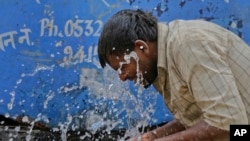A new report from the International Labor Organization (ILO) warns that increasing heat stress due to global warming will result in huge job and economic losses in 2030, with poor countries being the biggest losers.
The ILO report titled “Working on a warmer planet: The impact of heat stress on labor productivity and decent work” says rising temperatures and increasing heat stress at work will lead to the loss of 80 million full time jobs and to global economic losses of $2.4 trillion in 2030.
Authors of the study call their estimates conservative as projections are based on a global temperature rise of 1.5 degrees Celsius by the end of the century. Climate scientists predict temperatures could rise by as much as 3 degrees Celsius.
The report says people who work outdoors mainly in the agricultural and construction sectors will be most affected by rising temperatures. It says agriculture will account for 60 percent of global working hours lost due to heat stress, followed by the construction sector with an estimated loss of 19 percent.
The chief of the ILO’s research department and a main author of the report, Catherine Saget, says southern Asia and western Africa are the most seriously affected regions. Seven of the hardest-hit areas are described as least-developed countries in Africa.
“Heat stress is concentrated in countries, in regions with existing decent work deficits, a large share of informal employment, extended working poverty, and limited social security coverage," she noted.
"In Africa, for example, 75 percent of the population has no legal health protection.”
Saget says 2.3 percent of working hours will be lost in Africa in 2030 due to heat stress, which is higher than the global average of 2.2 percent.
The report says workers in wealthy countries also will be affected by excessive heat, but to a much lesser extent than those in poor countries. This, it notes, will widen the inequality gap between low-and high-income countries and result in worsening working conditions for the most vulnerable.
The ILO urges governments to enact policies to address heat stress risks and protect workers. These include the creation of better working conditions and improving early warning systems for heat events. It also calls for enhancing occupational safety and health to help people tackle heat-related hazards.




